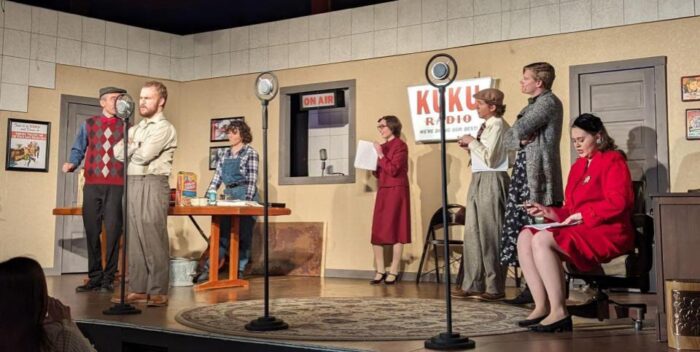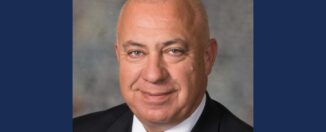“The Last Radio Show” brings back golden age of radio
Photo description: Adam Prince’s character looks confused as other characters banter behind him.
Photo credit: Mi-Ree Zwick
Mi-Ree Zwick
Sower Staff
Concordia Professor of Communication and Theatre Arts Bryan Moore this weekend directed a radio play, the two-act comedy “The Last Radio Show,” at Olde Glory Theater in Seward, with Concordia students making up much of the cast.
“It’s an Olde Glory production,” Moore said. “It’s not really sponsored by our [theatre] department, but we are very involved.” Other than a Concordia alum, there was only one non-CUNE cast member.
Moore, who has directed the majority of Olde Glory January productions for years, said he usually looks for a comedy of about 90 minutes or less because audiences enjoy them.
The play is about the staff of KUKU Radio Station, who are trying to prevent the station from being sold to someone who will fire them. As disasters befall the station, the staff work together to keep from being fired but one by one the actors end up being unable to perform. It is up to everyone else to save the day by taking on roles they never had before.
Radio plays mainly focused on presenting characters and live sound effects. Historically, the radio station would hire actors to perform characters and someone to create sound effects on the air. During radio’s so-called Golden Age, actors would get their scripts the day of the performance and create their characters on the air. The majority of “The Last Radio Show” ends up being read like an actual radio show.
Cast member Adam Prince, a CUNE senior and a theater major, said the cast got the play a little later than usual so “almost all of the memorization and blocking has been done just in two weeks.”
The format of a radio play allows the cast to have scripts in hand during the show.
“It’s helpful for our actors,” Moore said. “Because they don’t have to memorize the entire 90-minute play.”
Actor Sara Erickson said she didn’t know much about her character, Rita, other than that she was a receptionist at the station who is good at filing, as long as it is her nails.
“That’s all I was given, and I have added so much sass to it and a bunch of other things,” Erickson said.
Prince said theater allows actors to make bonds with other people “ironically, being anyone other than yourself.”
“But through that, it’s easier to discover who other people are through situations where they feel okay letting their guard down and being outlandish.”
The theater program’s next main stage production at Concordia will be “Little Women,” scheduled for the end of March.






















